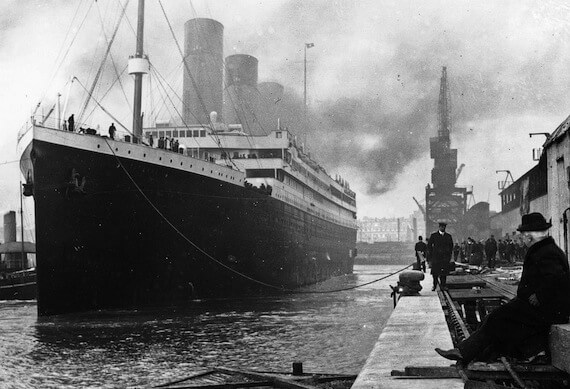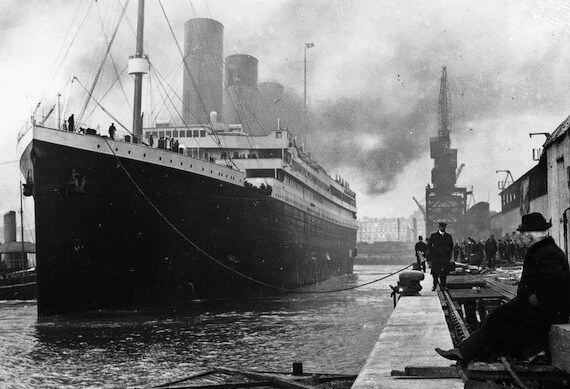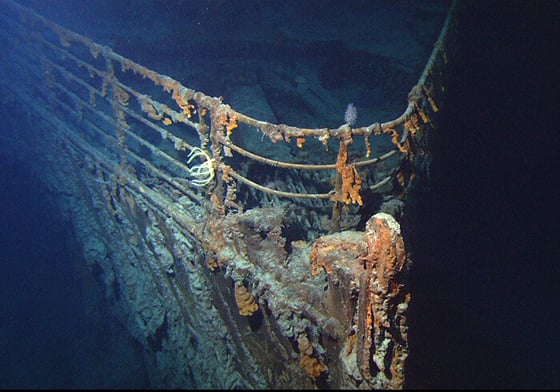
More than 100 years ago, the RMS Titanic hit an iceberg just before midnight, sending it to the bottom of the North Atlantic in the early hours of April 15, 1912.

(Photo: Titanic at the docks of Southampton, 1912. Public Domain.)
The re-release of the blockbuster movie in 3-D has resurfaced tremendous interest in the ill-fated vessel. With the exception of Noah’s Ark, the Titanic has intrigued more people than any other vessel in history.
Experts of its day hailed this “ship of dreams” as “practically unsinkable.” One seaman even went so far as to say: “God Himself couldn’t sink this ship!” Thomas Andrews, one of the Titanic’s designers, boasted: “The ship is as perfect as human brains can make.”
That’s why the morning after the sinking most people refused to believe the “unsinkable” had sunk. Even the Wall Street Journal printed an optimistic report:
The gravity of the damage to the Titanic is apparent, but the important point is that she did not sink. [Man’s] brain has within it the spirit of the divine, and he overcomes natural obstacles by thought, which is incomparably the greatest force in the universe.
I read a book on the inquiry that took place immediately following the arrival of the Titanic’s survivors in New York. After fully investigating the reasons for the sinking, Senator William Smith reported:
No drill or station practice or helpful discipline disturbed the tranquility of that voyage; and when the crisis came, a state of absolute unpreparedness stupefied both passengers and crew. . . . Indifference to danger was one of the direct and contributing causes this unnecessary tragedy. —Senator William Smith
What Causes Us to Sink
Fast forward 100 years, and things haven’t changed much. Our hearts push us with words like icebergs. “Never depend on anyone.” “Save face at all costs!” “Stand alone.” And the root of this advice?
Pride.
Pride is like a cancer that permeates every part of who we are. It affects how we look at ourselves and others. It’s what we feel when we’ve made a mistake but refuse to admit it. Pride causes us to stand our ground when we ought to ask forgiveness. Pride lashes out and spews illogical blather, because it has no real basis for battle. Pride can blind us into thinking the world owes us an apology—or that God does.
The old prophet Obadiah said it well:
The arrogance of your heart has deceived you, you who live in the clefts of the rock, in the loftiness of your dwelling place, who say in your heart, ‘Who will bring me down to earth?’—Obadiah 3
Speaking to those who felt they were unsinkable, Obadiah teaches us that pride blinds us to the truth.
I remember reading in People magazine where the actress Kate Winslet (who played “Rose” in the Titanic movie) made the statement that when someone we love dies, “it puts a hell of a lot in perspective.” In other words, tragedy teaches truth the hard way.
Pride only shows us the tip of the iceberg. Devastation awaits the one who refuses to steer clear of it.
How to Avoid that Sinking Feeling
Take an honest look at your relationships, particularly the strained ones. If you’re honest, isn’t pride lurking beneath the surface of it all? Isn’t it pride that points the finger to everyone else but yourself? It’s time to abandon a foundering vessel. Walk humbly with your God.
If we find ourselves on the ship of pride, we should listen to the warning of Fredrick Fleet, the Titanic’s lookout:
Iceberg, right ahead!—Fredrick Fleet, lookout for the Titanic
Tell me what you think: What’s an instance you’ve seen in someone’s life when pride has blinded them to reality? Any lesson you’ve learned? To leave a comment, just click here.
Click here to leave a comment.
-1.png?width=5230&height=1198&name=unnamed%20(4)-1.png)


.jpg?width=350&name=Wayne-books-350wide%20(1).jpg)




